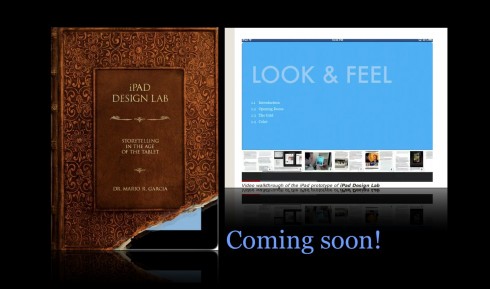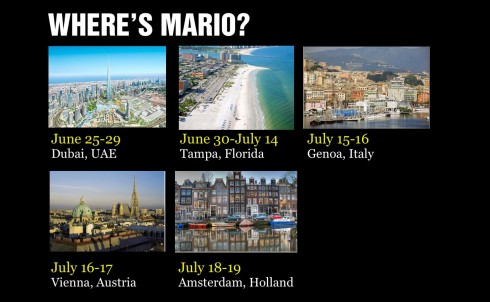TAKEAWAY: Reading over the transcript of the 2010 Poynter Institute for Media Studies conference about the tablet makes us realize how much has happened of consequence in such a short period of time. Here are some highlights. Based on what we have learned, how would I organize such a conference today?
Words that still resonate today
It has been exactly over two years since we organized and participated in The Power of the Tablet conference at The Poynter Institute for Media Studies (June 14-15, 2010).
The iPad had just been out a couple of months, and we knew that we had to gather the best minds in the industry to talk about it, project its future and share whatever they had discovered in the limited time they had worked with Apple’s most favorite tool so far.
As I put the finishing touches on my digital book,The iPad Design Lab: Storytelling in the Age of the Tablet, which you will hopefully be able to download in late July or early August, I am revisiting the transcript of the conference, and rereading some of those great presentations from a variety of talented colleagues, drawing some conclusions, while saying a few Amens as I read highlighted quotes from here and there.
Among some of those, and looking at them from the prism of 48 months later, here are some statements that stand out and make us pause for thought and action:
Jennifer Brooks, The New York Times:
“Designing and supporting great apps requires us to be platform-centric”.
“Great apps require unprecedented collaboration and are crafted to enhance the lives of humans.”
DW Pine, TIME Magazine:
“Provide a sit-down experience for the reader with videos.”
Alfredo Trivino, formerly of News Corp (London), now chief of Audacity Partners:
“In the evening, try a lighter version, but still news-heavy.”
“Customers want tactile, intuitive content.”
Roger Fidler, of University of Missouri, Reynolds School of Journalism:
“The era of printing newspapers on paper is coming to an end.”
“Advertising is the key to success in tablet editions. Subscriptions will not create enough revenue.”
“As we work with digital editions—keep people within the context of the publication as long as possible. Advertisers need to think of image and information within the digital newspaper edition.”
Joe Zeff, Joe Zeff Design:
“Create something entirely new.”
“Print lets you read and look. Apps let you read, look, watch, listen, search, organize, connect, play, buy.”
Andrew DeVigal, The New York Times:
“Many of the best iPad apps work in the cloud, synchronizing between the tablet, phone and computer.”
Bill Couch, USA Today:
“Gestures are the shortcuts for touch interface.”
Eric Schut, WoodWing:
“Technology does not have to be a bottleneck.”
Gary Cosimiini, Adobe:
“Optimization will definitely come soon.”
Mario Garcia Jr., Garcia Media/Garcia Interactive:
“If you are going to have a scroll—give a visual indication of it. Do you go up-down or left-right?”
Steve Dorsey, Detroit Media Partnership:
“You have to try everything and not worry about what happens. Some things will work, and some won’t. Just figure out what things to bet the most on.”
Jennifer George Palilonis, Ball State University:
“ We tell students (in her iMedia class) you can get an A in this class even if the app fails miserably as long as you worked very , very hard at failing miserably, it is not the typical classroom experience.”
What would the Tablet conference of 2012 look like?
There is a lot of current wisdom on some of those quotes from our 2010 line up of speakers at Poynter. To read the transcript is to reaffirm what was then just thoughts at large, but that today have become daily realities for many of us.
If Poynter, or any other organization, would ask me to organize the ultimate Tablet conference in 2012, what would I include:
While I am very proud of what we did in the infancy—-should we say “birth”——of the tablet, we have advanced tremendously since then.
Today, and based on the experience of writing my digital book on the subject over the past 8 months, I would plan a conference as follows:
Theme of the conference: Telling stories in the iPad. (Indeed, I would call it iPad and NOT tablet. Sorry, but the majority of the audience we deal with has an iPad, so I am not going to ignore that and go by the more generic name. I know there will be detractors on the subject!)
Centerpieces: After we plan the necessary stories on Storytelling, the conference would be mostly about Economics and Advertising. We now know more about how to take our stories to the tablet than we know how to capitalize on revenue producing solutions. The world needs a quick mini MBA on the economics of the tablet. In fact, I have no objections to putting a dollar sign on the S for $torytelling.
Video/Animation/Pop Ups: I would then devote the last third of the conference to stories that make the finger happy, as in more video, audio, animated graphics, because we are hurting badly in there.
In 2012, it is not enough to put the pages of the printed edition there.
And, by the way, I would have the large room conference for the masses the first day, then very small and intimate “tablet salons” the next day, with the large group reconvening the last day.
This three-day tablet conference dances in my head. Now we need someone who would like to stage it. Working title for the conference?
Preparing for the Next Generation of News Apps,
My dancing shoes are on.
Of special interest today
Flipboard in content deal with The New York Times
http://bits.blogs.nytimes.com/2012/06/25/flipboard-in-content-deal-with-new-york-times/
The iPad Design Lab: Storytelling in the Age of the Tablet

Video walkthrough of the iPad prototype of iPad Design Lab
